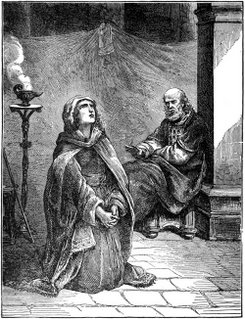Jumping to conclusions

It ought to be a time of joy and celebration. But a woman weeps. Each year, at this time of the year, she is filled with heaviness. Her heart is overflowing with sorrow. While everyone around her is enjoying the celebrations, she, Hannah, is depressed and full of sadness. While everyone around her celebrates, Hannah does not.
.
On this day, we join Hannah as she prays. She is pouring her heart out to God. There are many things that have conspired to make Hannah not only deeply unhappy and sorrowful, she is also depressed to the point of no longer eating. A bitterness has filled her soul.
.
Hannah finds herself unable to conceive a child. Her husband has another wife who bears children easily. ( Bigmany was common among this people - a people, the Bible reminds us were given to doing their own thing - even though it was against God's will for his people.)
.
This "other" woman in Hannah's life made life miserable for her. This "other" woman ridiculed Hannah and would provoke her to tears - especially at this time of the year, when the whole family made it yearly pilgrimage to give thnaks to God for the blessings of freedom and peace. There was no peace in Hannah's life. To add insult to injury, the old priest, as he watched Hannah pray, though she was drunk and the proceeded to tell her to sober up as she was leaving the temple.
.
Hannah does not fly off the handle or get angry with this old priest. The author of the story gives us a glimpse into Hannah's personality as she quietly explains that she was "pouring out her soul" to the Lord. Hannah's great pain is also her great shame - she is unable to bear a child.
Now the old priest could be forgiven for making such a pastoral blunder. However, we must remember that Hannah lived in a time when everyone did their own thing, neglecting Godly things. Why, even the old priest's two sons, both priests themselves will be involved in a scandal involving sexual impropriety at the temple itself.
Perhaps the point of the story is that like the old priest, we are quick to jump to conclusions and judge people. Perhaps the old priest saw only degrading behaviour everyday from among the people who came to worship at the temple during this great festival. Perhaps he only saw people feasting and drinking to the point of over-indulgence, and engaging in activities that they would not dream of if they wer "back home" and all of it done under the disguise of a religious celebration.
.
How ever, the old priest was quick to jump to conclusions. When Hannah explained her pain, then nthe bold priest pronounced a blessing on Hannah and sent her on her way. The story has a happy ending. Hannah conceives and gives birth to a son. She names him Samuel, because she "asked the Lord for him". Samuel will be the one to anoint David as Israel's greatest king.
.
Perhaps, the point of the story is not about jumping to conclusions, although it might serve an old priest better if he at least asked the woman who she was doing before jumping in with both feet. Perhaps the point of the story is that after many years of pain and desolation that had led to her depression, God would finally hear her prayers.
.
For me though, the point of this story, like the story of Ruth before it, is that God is at work in and through our pain and suffering. God is at work even when we go off and do our own thing. God is always at work.
.
Perhaps as a priest I need to remember not to jump to making quick conclusions.
.
We all need to know that God hears our prayers.
.
And that God is always at work in and through our lives.
.

0 Comments:
Post a Comment
<< Home